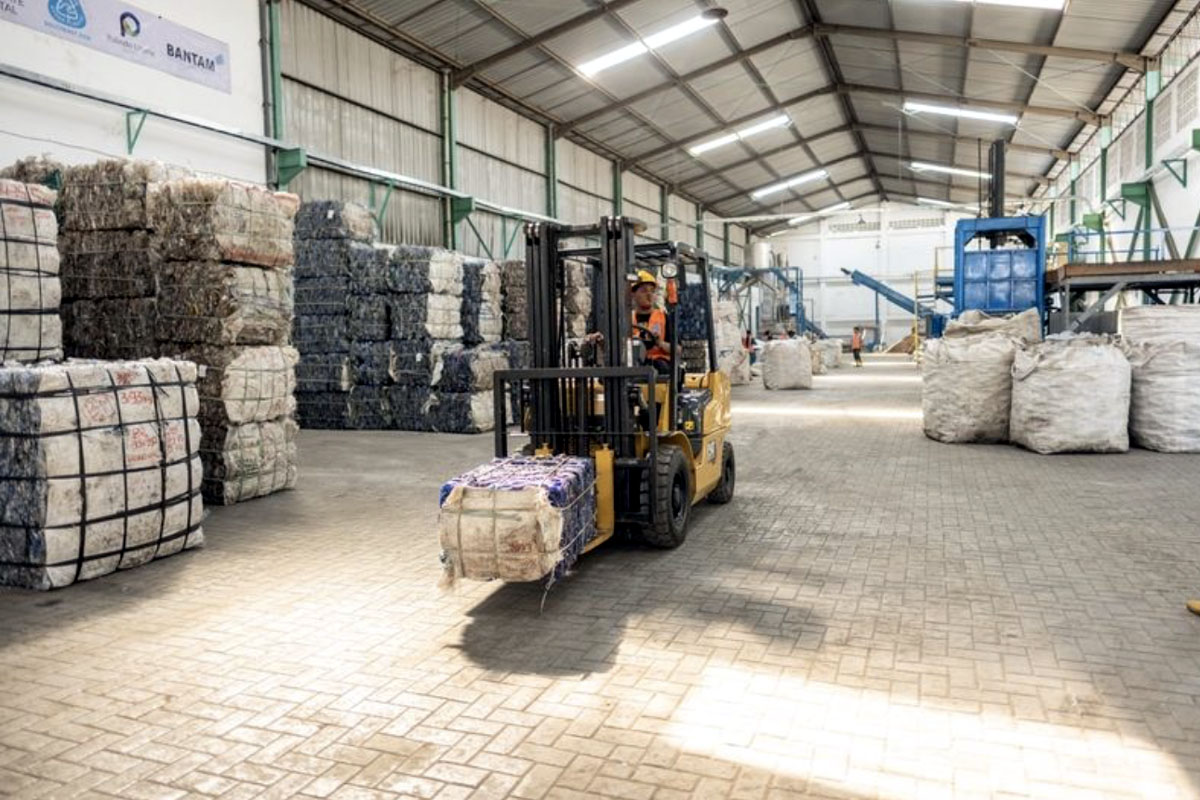
Prevented Ocean Plastic Southeast Asia opened an aggregation center in Semarang, Indonesia, with a capacity of about 500 metric tons per month. | Courtesy of Prevented Ocean Plastic
A company that specializes in collecting PET and other plastics at risk of entering the ocean continues to expand its collection infrastructure in Southeast Asia with support from the U.S. government.
Prevented Ocean Plastic Southeast Asia (POPSEA) in June opened an aggregation center in the fast-growing Indonesian city of Semarang. The facility, which has a capacity of about 500 metric tons per month and directly employs 40 people, was funded through a blended public-private finance model that included a grant from the U.S. Agency for International Development (USAID).
The U.S. federal government money came after USAID officials conducted a nine-month deep dive due diligence at POPSEA facilities in Indonesia, said Vytas Gruodis, co-founder and director of Prevented Ocean Plastic.
“They were satisfied that Prevented Ocean Plastic was their preferred model for building infrastructure in developing countries that are not served by any formal recycling,” he said in an interview with Plastics Recycling Update.
“We’re in the unique position of saying Prevented Ocean Plastic has been endorsed by the U.S. government,” he later said. “We think that’s a great thing.”
He explained that the collection model involves establishing safe and sanitary facilities where workers are guaranteed certain wages and healthcare and are free from any coercion or intimidation. The model also involves transparent pricing and chain of custody mapping, so each kilogram of plastic can be traced back to its coastal origin.
He noted the biggest consumer product brand owners in the world also require those standards in their supply chains.
“Our goal is really to elevate recycling standards in the informal waste sector and provide those key resources,” he said.
Expanding its Indonesia presence
POPSEA is a collaboration between Indonesian PET reclaimer PT Polindo Utama, circular economy investment management firm Circulate Capital and global RPET supplier Bantam Materials, of which Gruodis is the North American director (Prevent Ocean Plastic is also Bantam Materials’ brand name for its PCR).
Circulate Capital last year announced an investment in POPSEA to help it expand its scrap collection footprint in the region. That investment, which came in the form of an interest-bearing loan in the millions of dollars, with USAID providing partial loan guarantees to Circulate Capital.
POPSEA’s goal is to recover 88 million pounds of plastic per year over a decade, Gruodis said.
“So the long-term, broad-spectrum goal for this financial investment by Circulate Capital is 880 million pounds of plastic prevented from reaching the ocean,” he said.
So far, POPSEA has established five collection centers across Indonesia. In addition to the Semarang aggregation center, Gruodis said, POPSEA has set up collection centers in Pagang (currently handling about 105 metric tons per month), Palembang (85 metric tons per month), Bantul and Jambi (these were established only in June, so throughput estimates aren’t yet available). All the collection centers have a targeted volume of 120 metric tons per month.
Global collection goals
Around the time it announced the opening of the Semarang facility, Prevented Ocean Plastic announced a larger goal to open 25 new collection centers by 2025. In aggregate, those centers will collect roughly 54,000 metric tons of plastic per year.
According to the announcement, the facilities will open on four continents “in regions that have historically lacked recycling infrastructure to deal with their plastic waste,” including Southeast Asia, South America, Sub-Saharan Africa and the Mediterranean.
Since its inception, Prevented Ocean Plastic as a global program has recovered just over 66 million pounds of plastic, Gruodis said. He noted the company is also actively working in the African countries of Ghana and Tanzania and the Latin American countries Ecuador and Honduras. They’re looking to expand into Peru, Vietnam and other countries, he said.